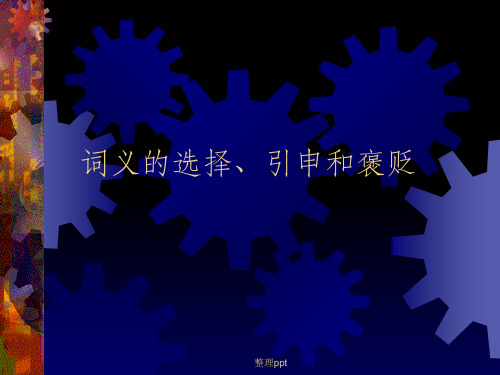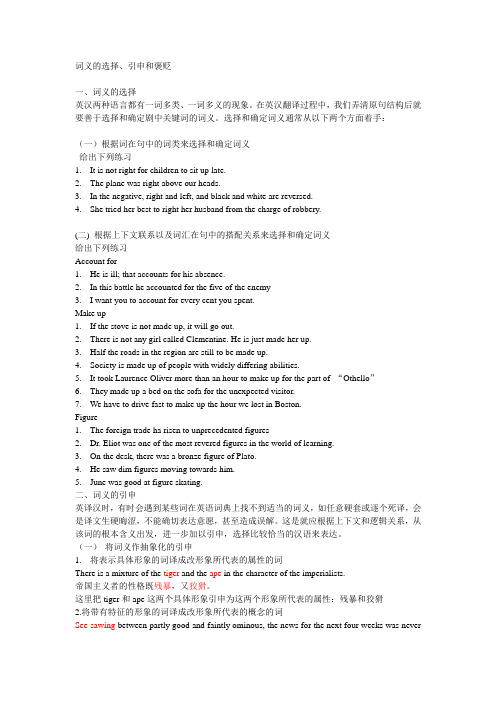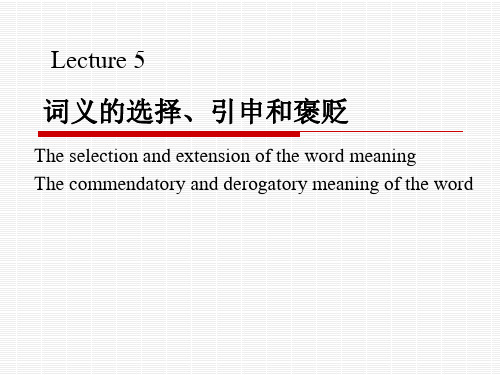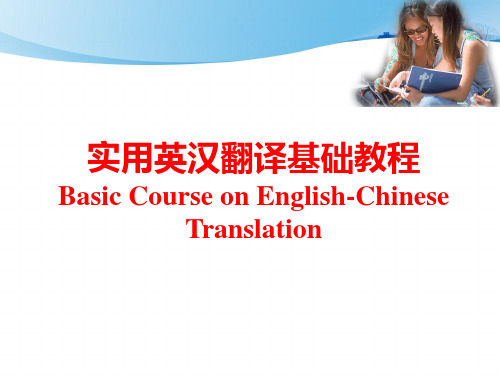词义选择引申褒贬
词义的选择引申和褒贬

2、将带有特征性形象的词译 成该形象所代表的属性的词。
整理ppt
1) Rich and powerful, he always goosesteps on the street.
整理ppt
1) Goosestep的原义是从名词 “鹅步、正步” 转化而来的动 词,根据上下文引申,译成: “他有钱有势,在街上总是耀 武扬威,横行霸道。”
整理ppt
2)He is in critical condition, see-sawing between life and death.
整理ppt
2) See-saw原义是“跷跷 板”,这里引申译为:他的病 况危急,时好时坏,在生死之 间徘徊。
整理ppt
(二)具体化引申
整理ppt
语时一般作具体化引申。
整理ppt
2)He is a Shylock!
整理ppt
2) Shylock是莎士比亚笔下 的人物,其人刻薄歹毒,故该 句引申译为:他凶险狡诈。
整理ppt
Every life has its roses and thorns.
整理ppt
这里把玫瑰和刺引申,译为: “每个人的生活有苦有甜。”
整理ppt
整理ppt
2)他的学位成了他进入那家 公司获得高薪的敲门砖。
整理ppt
2. 英语中有些词在特定的上 下文中,含义是清楚的,但译 成汉语时还必须作具体化引申, 否则就不够清楚。
整理ppt
1) The car in front of me broke down and I missed the green.
整理ppt
She is a good Christian, a good parent, a good wife, a good daughter and a good teacher.
词义的选择、引申和褒贬

词义的选择、引申和褒贬一、词义的选择英汉两种语言都有一词多类、一词多义的现象。
在英汉翻译过程中,我们弄清原句结构后就要善于选择和确定剧中关键词的词义。
选择和确定词义通常从以下两个方面着手:(一)根据词在句中的词类来选择和确定词义给出下列练习1.It is not right for children to sit up late.2.The plane was right above our heads.3.In the negative, right and left, and black and white are reversed.4.She tried her best to right her husband from the charge of robbery.(二) 根据上下文联系以及词汇在句中的搭配关系来选择和确定词义给出下列练习Account for1.He is ill; that accounts for his absence.2.In this battle he accounted for the five of the enemy3.I want you to account for every cent you spent.Make up1.If the stove is not made up, it will go out.2.There is not any girl called Clementine. He is just made her up.3.Half the roads in the region are still to be made up.4.Society is made up of people with widely differing abilities.5.It took Laurence Oliver more than an hour to make up for the part of “Othello”6.They made up a bed on the sofa for the unexpected visitor.7.We have to drive fast to make up the hour we lost in Boston.Figure1.The foreign trade ha risen to unprecedented figures2.Dr. Eliot was one of the most revered figures in the world of learning.3.On the desk, there was a bronze figure of Plato.4.He saw dim figures moving towards him.5.June was good at figure skating.二、词义的引申英译汉时,有时会遇到某些词在英语词典上找不到适当的词义,如任意硬套或逐个死译,会是译文生硬晦涩,不能确切表达意愿,甚至造成误解。
词义的确定、引申和褒贬

以challenge一词为例:
⑴ I challenge you to answer my question. 我要你回答我的问题。 ⑵ She challenged him for lying. 她指责他说谎。 ⑶ I now challenge Mr. Ford to deny that statement. 现在我要问福特先生敢不敢否认那篇讲话。 ⑷ I’ve constantly challenged my own conclusion. 我一直在重新考虑自己的结论。 ⑸ The United States Government does not challenge that position. 美国政府对这一立场不提出异议。
⑹His question challenged us to think. 他提出的问题促使我们去思考。 ⑺ The task challenged his organizing ability. 这项任务对他的组织能力是一个考验。 ⑻ The sentry challenged us. 哨兵问我们口令。 ⑼ Recent discoveries have challenged their old notion. 最近的发现使得他们原来的观念成了问题。 ⑽They challenge for the Davis Cup. 他们决心争夺戴维斯杯。 ⑾ It’s the challenge of our time. 这是我们时代的要求。 ⑿ Their success is a challenge to my effort. 他们的成就鞭策我做出努力。
词义的选择
英国语言学家Firth说: Each word when
used in a new context is a new word.
词义的选择、引申和褒贬1

(二) 根据搭配
Don’t pick up strange boys. 别和不认识的男 before six? 你能不能在6点以前来接我? She picked up a used camera at the flea market. 她在跳蚤市场买了一架旧照相机。
(二) 根据搭配
我可不吃这一套。
I won’t take all this lying down. 他要请我们吃馆子。
He is going to invite us out to dinner. 这种纸不吃墨水。
This kind of paper doesn’t absorb ink. 这件事你如果说出去,我叫你吃不了兜着走。
If you let this leak out, I’ll make you sorry for it. 只要技术好,到哪儿都吃得开。 A person who has expertise is welcome anywhere. 他在银行存款,吃利息。 He deposits money in the bank to get interests.
(四) 根据词性不同,词义不同
I want to present everyone present a present. 我想给在场的各位赠送一份礼物。 动词,赠送;形容词,在场的;名词,礼物 He was too close to the door to close it. 他离门太近以至于关不了门。 形容词,接近的;动词,关
It is wise to object to the unknown object. 拒绝不明物体是明智的。 动词,拒绝;名词,物体 Peter decided to desert his wife in the desert. 彼得决定把妻子抛弃在沙漠里。 动词,抛弃;名词。沙漠
词义的选择、引申、褒贬

词义引申(具体——抽象)
Grey hair should be respected(synecdoche) The pen is mightier than the sword. (metonymy) The invention of machinery had brought into the world a new era---the Industrial Age. Money had become King. (metonymy) 机器的发明使世界进入到一个新纪元即工业时 代,金钱成了主宰一切的权威。 He is a rolling stone. I don’t think he can go far. 他是个见异思迁的人,我想他不会有多大出息。
三、词义的褒贬
有些词义是中立的,本身不表示褒义或者贬义, 但在一定的上下文中可能有褒贬的意味. demanding He found that being a CEO was a demanding job. 他发现当首席执行官是个费力的工作。 As a demanding boss, he expected total loyalty and dedication from his employers. 他是个苛刻的老板,要求手下的人对他忠心耿 耿,鞠躬尽瘁。
小结(summary)
词义的选择: 根据词性来选择词义(word meaning) 根据上下文来选择词义(context) 根据搭配关系来选择词义(collocation)
二、词义的引申(extension)
引申的方法:抽象化引申 & 具体化引申 抽象化引申:具体——抽象 Do you think this dictionary of English is the supreme court in all matters concerning English words? 你认为这本英语词典是英语词汇的权威词典吗? See-sawing between partly good and faintly ominous, the news for the next four weeks was never distinct. 在那以后的四个星期内,消息时而部分有所好转,时而 又有点不妙,两种情况不断地交替出现,一直没有明朗 化。
第一讲词义选择引申褒贬解析

实用英汉翻译基础教程
Basic Course on English-Chinese Translation
词义选择 词义引申 词义褒贬 练习
词义的选择
英汉两种语言都有一词多类、一词多义的现象。一词多类就是指一个词 往往属于几个词类,具有几个不同的意义。一词多义就是说同一个词在 同一个词类中,又往往有几个不同的词义。在英汉翻译过程中,我们在 弄清原句结构后就要善于选择和确定原句中关键词的词义。
“正确的用词同几乎正确的用词之区别就好比闪电同萤火虫之区 别”。 ——马克吐温
选择了恰当的词语,真乃犹如闪电,让你眼前一亮,仿佛看到智慧 的光芒。
I got on horseback within ten minutes after I got your letter. When I got to Canterbury, I got a chaise for town, but I got wet through, and have got such a cold that I shall not get rid of it in a hurry. I got to the Treasury about noon, but first of all got shaved and dressed.
week 7 第四章1词义的选择、引申和褒贬
轻音乐 轻微的损失 轻便的汽车 轻松的心情 轻快的脚步 轻浮的举止 轻巧的装备 轻松的工作 轻柔的声音
Reasons for using diction: Polysemy and different collocation
eat soup heavy rain
strong wind
black tea
第四章
第一节 词义的选择、引申和褒贬
一、词义的选译 Diction
By ―diction‖ we mean the proper
choice of words and phrases in
translation on the basis of accurate comprehension of the original.
brown sugar
strong tea prime time
喝汤 大雨 大风 红茶 红糖 浓茶 黄金时间
选择词义的要领
1. 根据词性选择词义
2. 根据上下文及逻辑关系选择词义 3. 根据搭配选择词义
1. 根据词性选择词义
Every penny I earned from the work was
词义的引申主要包括:
– 抽象化引申 – 具体化引申 – 典故的词义引申
2.1 抽象化引申
I was practically on my knees but he still
refused. 我几乎是苦苦哀求,但他依然拒绝。 The two sisters were usually in agreement on most issues, but they were at swords’ points on the matter of abortion. 在很多问题上姐妹俩的意见通常是一致的, 但在人工流产问题上,她们是有激烈争 执的。
笔译(词语的选择、引申和褒贬)
(二) 根据上下文联系以及句中的搭配关系 来选择和确定词义。 He is the last man to come. 他是最后来的。 He is the last man to do it. 他决不会干那件事。
He is the last person for such a job. 他最不配(最不适合)干这工作。 最不配(最不适合) He should be the last to blame. 怎么也不应该去怪他。 He is the last man to consult. 根本不宜找他商量。 This is the last place where I expected to meet you. 我怎么也没有料到会在这个地方见到你。
In the sunbeam passing through the window there are fine grains of dust shining like gold. (prep.) 在射入窗户的阳光里,细微的尘埃象金子一般在闪闪 发亮。 Like knows like. (n.) 英雄识英雄。
练习
1. It is not right for children to sit up late. The plane was right above our heads. In the negative, right and left, and black and white are reversed. She tried her best to right her husband from the charge of robbery.
4. No sooner was the avalanche of Christmas cards swept away the publishers began to fill the shops with their novel valentines. 5. The habit of sending gifts is dying out, which is disappointing for the manufacturers, who nevertheless still hopefully dish out presents for Valentine’s Day in an attempt to cash in.
词义选择与引申2
第四讲词义的选择、引申与褒贬词汇篇(1)词义的选择、引申与褒贬Focus:Ø 基于对源语文本的精确理解在目的语中选择恰当的词语和表达法Ø 词义的引申Ø 词义的感情色彩? 如何在翻译中选择精当的词语?Ø 注意一词多义现象,不能误用。
Ø 正确看待翻译时所使用的词典。
不能把词典当成选择词义的万能钥匙。
如果生硬地将词典的释义搬到译文中去,常易犯一些非常荒谬的错误。
翻译中,译者寻求的不只是词义的静态对应,而是词义交叉中的动态对应关系。
Ø 注意词义的灵活性(flexible),翻译中充分发挥自身的创造性。
? 一、根据词性来确定词义? 许多英语词汇往往有不同的词性,即分属于几种不同的词类。
翻译时首先要确定这个词在句子中属于哪一类词,然后再根据词类选择一个确切的词义。
? 例如:like作形容词时意思是“相同的”;作动词时意思是“喜欢、希望”;作介词时意思是“像……一样”;作名词时意思是“喜好、英雄”,如:Like knows like.(英雄识英雄)。
? 下面再以right为例加以说明:Ø Right,open your mouth,let me have a look.Ø 好,把嘴张开,让我来瞧瞧。
(感叹词)Ø He hoped to be absolutely right about this issue.Ø 他希望在这个问题上绝对正确无误。
(形容词)Ø I must answer that phone,but I‟ll be back right away.Ø 我得去接电话,马上就回来。
(副词)Ø The ship righted itself after the big wave had passed.Ø 大浪过后,船又平稳了。
(动词)Ø In England,we drive on the left side of the road,not the right side.Ø 在英国,车辆靠路的左侧行驶而不是靠右侧行驶。
第5讲 词义的选择、引申和褒贬
一、词义的选择
语境的定义(Malinowsky, 1923) 狭义:语言性语境指的是交际过程中某一话语结 构表达某种特定意义时所依赖的各种表现为言辞 的上下文,它既包括书面语中的上下文,也包括 口语中的前言后语; 广义:非语言性语境指的是交流过程中某一话语 结构表达某种特定意义时所依赖的各种主客观因 素,包括时间、地点、场合、话题、交际者的身 份、地位、心理背景、文化背景、交际目的、交 际方式、交际内容所涉及的对象以及各种与话语 结构同时出现的非语言符号(如姿势、手势)等。
A. 根据上下文中的词性确定词义 (round)
He was knocked out in the second round. 他在第二回合的比赛中被击倒。 n. 回合
The Earth turns round once in 24 hours. 地球二十四小时自转一圈。 adv. 绕圈子,围绕地
A. 根据上下文中的词性确定词义
(light)
The lake was bathed in the soft light of the moon. 湖水沐浴在柔和的月光下。 n. 光,光线,光亮
I lighted my sister up the stairs to bed with a candle. 我点着蜡烛带妹妹上楼去睡觉。 v. 点火,点燃
练习(根据搭配 make up)
It‘s time for you to make it up with your sister. You must make up what you owe before the end of the month. She made the material up into a dress. Farming and mining make up most of the country‘s industry. The chemist is making up the doctor‘s prescription. They made him up as an old man for the last act of the play. There isn‘t any girl called Clementine. He‘s just made her up.
- 1、下载文档前请自行甄别文档内容的完整性,平台不提供额外的编辑、内容补充、找答案等附加服务。
- 2、"仅部分预览"的文档,不可在线预览部分如存在完整性等问题,可反馈申请退款(可完整预览的文档不适用该条件!)。
- 3、如文档侵犯您的权益,请联系客服反馈,我们会尽快为您处理(人工客服工作时间:9:00-18:30)。
第四章第一节词义的选择,引伸和褒贬一、教学目的:要求准确理解句子中词的意义,从而在翻译时做出正确的选择。
二、教学过程:一、词义的选择:英汉两种语言都有一词多类、一词多义的现象。
一词多类就是指一个词往往属于几个词类,具有几个不同的意义。
一词多义就是说同一个词在同一个词类中,又往往有几个不同的词义。
在英汉翻译过程中,我们在弄清原句结构后就要善于选择和确定原句中关键词的词义。
选择和确定词义通常从以下几个方面着手:1. 根据词在句中的词类来选择和确定词义选择某个词的词义,首先要判明这个词在原句中应属哪一种词类,然后再进一步确定其词义。
例如,在Like charges repel; unlike charges attract 一句中,like用作形容词,它的汉语对应意义是“相同的”,因此全句可以译为:“相同的电荷相斥,不同的电荷相吸”。
但在下面例句中,like又分属其他几个不同词类:1) He likes mathematics more than physics. 他喜欢数学甚于喜欢物理学。
(动词)2) In the sunbeam passing through the window there are fine grains of dust shining like gold.在射入窗内的阳光里,细微的尘埃象金子一般在闪闪发光。
(前置词)3) Like knows like. 英雄识英雄。
(名词)2. 根据上下文联系以及词在句子中的搭配关系来选择和确定词义英语中同一个词,同一词类,在不同场合往往也有不同的含义,必须根据上下文的联系以及词的搭配关系或句型来判断和确定某个词在特定场合下所应具有的词义。
例如“Last”这一形容词:1) He is the last man to come. 他是最后来的。
2) He is the last man to do it. 他绝对不会干那件事。
3) He is the last person for such a job. 他最不配干这个工作。
4) He should be the last(man)to blame. 怎么也不该怪他。
5) He is the last man to consult. 根本不宜找他商量。
6) This is the last place where I expected to meet you. 我怎么也没料到会在这个地方见到你。
再如“take off)这一动词:1) To take off her boots or to put them on was an agony to her,but it had been an agony for years.脱鞋或穿鞋对她是一种痛苦,但这已经是多年以来的痛苦了。
2) An area the size of the Hornet’s flight deck was marked off on an airstrip and the y practiced taking off time after time from this restricted space.在机场上标出了与大黄蜂号甲板一样大小的一块地方,他们(机组人员)一次又一次地联系从这样一块有限的面积上起飞。
3) He always sits on the very edge of his chair when he is working, as though about to take off.他工作的时候,总是坐在椅子边上,好像随时都会跳起身来的样子。
4) Their first major design was a pleated denim jean with external pockets dubbed “baggies” that took off in high schools and colleges and soon was imitated by other apparel manufacturers.他们的头一项重要设计是一种打褶的、缝上明袋的兰色斜纹粗布裤,这种裤子人们称为“袋子”,在中学和大学中首先流行,接着别的服装商店也都很快仿制起来。
二、词义的引伸英译汉时,有时会遇到某些词在英语词典上找不到适当的词义,如任意硬套或逐词死译,会使译文生硬晦涩,不能确切表达原意,甚至造成误解。
这时就应根据上下文和逻辑关系,从该词的根本含义出发,进一步加以引伸,选择比较恰当的汉语词来表达。
现举例说明如下:1. 将词义作抽象化的引伸英语中,特别在现代英语中,常常用一个表示具体形象的词来表示一种属性、一个事物或一种概念。
翻译这类词时,一般可将其词义作抽象化的引伸,译文才能流畅、自然。
1.1 将表示具体形象的词译成该形象所代表的属性的词1) There is a mixture of the tiger and the ape in the character of the imperialists.帝国主义者的性格既残暴,又狡猾。
这里把tiger(老虎)和ape(猿)这两个具体形象引伸为这两个形象所代表的属性:“残暴”和“狡猾”。
2) Every life has its roses and thorns. 每个人的生活都有甜和苦。
这里把roses(玫瑰)和thorns(刺)这两个具体形象引伸为这两个形象所代表的属性:“甜”和“苦”。
1.2 将带有特征性形象的词译为该形象所代表的概念的词1) In fact the Bavarian environment was so charged with Nazi sentiment throughout the 1920s that Hitler's storm troops goosestepped into power in Furth in 1930...事实上,在整个二十年代,纳粹党在巴伐利亚一带已博得公众的好感,以至于在一九三O年,希特勒的冲锋队员就耀武扬威地夺取了菲尔特镇的权力。
To goosestep 是从名词Goosestep(鹅步;正步)转化来的动词,本作“鹅步走”或“正步走”解,这里goosestepped into根据例句上下文引伸为“耀武扬威地夺取”。
2) See-sawing between partly good and faintly ominous ,the news for the next four weeks was never distinct.在那以后的四个星期内,消息时而部分有所好转,时而又有点不妙,两种情况不断地交替出现,一直没有明朗化。
see-sawing是从see-saw(跷跷板)转化而来的动词,本作“玩跷跷板”解,这里根据上下文引伸为“两种情况不断地交替出现”。
2. 将词义作具体化的引伸2.1 英语中也有用代表抽象概念或属性的词来表示一种具体事物,译成汉语时一般可作具体化引伸。
1) As the Politburo gave the go-ahead to Brezhev, Nixon and Kissinger were meeting in the President's Kremlin apartment, prepared to accept a setback on SALT.在政治局向勃列日涅夫开放绿灯时,尼克松和基辛格正在克里姆林宫的总统下榻处开会,准备承受限制战略武器会谈失败的挫折。
2) Vietnam was his entree to the new Administration, his third incarnation as foreign policy consultant.越南战争成了他进入新政府的敲门砖。
他担任政府的对外政策顾问,那是第三次了。
2. 2 英语中有些词在特定的上下文中,其含义是清楚的,但译成汉语时还必须作具体化的引伸,否则就不够清楚。
1) The car in front of me stalled and I missed the green. 我前头的那辆车停住了,我错过了绿灯。
2) Jewish-owned shops were shut down.Swastikas replaced sixpointed stars. The walls of anti-Semitism were closing in. 犹太人的铺子关闭了。
卐字旗取代了六角星旗。
反犹太主义的包围圈一天紧似一天。
三、词义的褒贬语言本身虽没有阶级性,但在具体使用时不可能不为一定的阶级服务。
为了忠实于原文的思想内容,翻译时必须正确理解原作者的基本政治立场和观点,然后选用适当的语言手段来加以表达。
原文中有些词本身就表示褒贬意义,就应该把褒贬意义相应地表达出来;但也有些词语孤立起来看似乎是中性的,译成汉语时就要根据上下文恰如其分地把它们的褒义或贬义表达出来。
1. 英语中有些词本身就有褒贬意义,汉译时就应相应地表达出来,如:1) He was a man of high renown (fame). 他是位有名望的人。
(褒)2) His notoriety as a rake did not come until his death . 他作为流氓的恶名是他死后才传开的。
(贬)3) The tasks carried out by them are praiseworthy. 他们进行的事业是值得赞扬的。
(褒)4) Henry keeps boasting that he has talked to the President. 亨利总是吹嘘说他曾同总统谈过话。
(贬)5) "He was polite and always gave advice willingly," she recalled. 她回忆说,“他彬彬有礼,总是诲人不倦。
”(褒)6) We were shocked by his coarse manners. 我们对他的粗暴态度感到震惊。
(贬)2. 英语中有些词义是中立的,本身不表示褒义或贬义,但在一定的上下文中可能有褒贬的意味,汉译时就应该用具有褒贬意味的相应的词来表达,如:2.1 需要用褒义的词来表达1) Once early in 1974,while driving along the San Diego Freeway from Clemente to Los Angeles, he was asked to reflect on his hopes and ambitions.一九七四年初,有人同他一起驱车从克利门蒂沿圣地亚哥公路去洛杉机,途中请他谈了他的希望和抱负。
